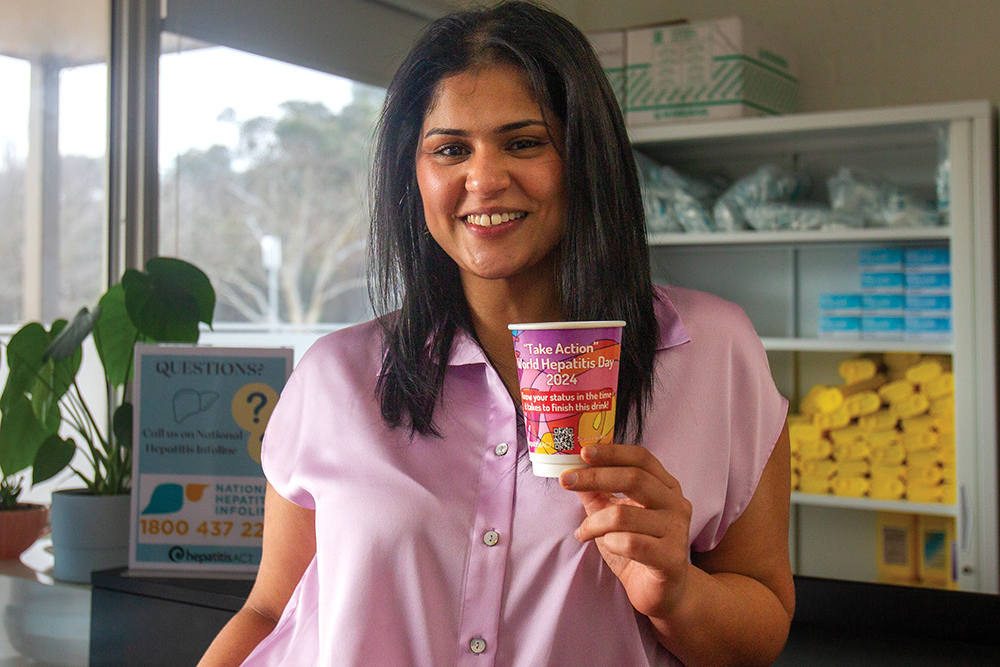With World Hepatitis Day on July 28, the spotlight turns to raising awareness about hepatitis B and C – the two most prevalent blood-borne viruses in Canberra and worldwide, says Hepatitis ACT executive director SARAH AHMED.
Viral hepatitis is an inflammation of the liver caused by viral infections, with five variations:
A, B, C, D, and E.
With World Hepatitis Day on July 28, the spotlight turns to raising awareness about hepatitis B and C – the two most prevalent blood-borne viruses in Canberra and worldwide.
Hepatitis ACT executive director Sarah Ahmed describes viral hepatitis as dangerous, silently damaging the liver without many obvious symptoms until it progresses severely.
“This condition, if untreated, can lead to chronic liver disease, cirrhosis, or even liver cancer, now one of Australia’s fastest-growing causes of cancer death,” she said.
In the ACT alone, more than 4500 individuals grapple with hepatitis B or C, with concerning trends showing that many remain undiagnosed, Ms Ahmed said.
Hepatitis B, primarily transmitted through blood-to-blood contact or from mother to child, affected nearly 3000 Canberrans, while hepatitis C, often spread through unsafe injecting use or unsterile medical practices, affected about 1500.
“The startling reality is that one in five people with hepatitis C and an alarming 70 per cent of those with hepatitis B in the ACT are unaware of their condition,” Ms Ahmed said.
“This lack of awareness underscores the critical need for proactive testing. Hepatitis ACT emphasises that early detection through simple tests can significantly alter the course of the disease.
“For instance, our fingerstick testing method provides rapid results, empowering individuals with knowledge about their hepatitis status within an hour.”
Ahead of World Hepatitis Day, Hepatitis ACT is calling for collective action.
The theme, “It’s Time to Take Action,” resonated deeply as global efforts aimed to eliminate viral hepatitis by 2030, Ms Ahmed said.

Locally, initiatives such as widespread vaccination and enhanced treatment accessibility were pivotal. Already, more than 97 per cent of children in the ACT received hepatitis B vaccinations by age two, a testament to achievable public health goals.
To galvanise the community, Hepatitis ACT has launched a coffee cup campaign, distributing custom coffee cups to local cafes. These visual reminders aims to inspire more people to get tested.
“We’re hoping that we’ll have community champions who will say: ‘Hey, I got tested, it was fine, it wasn’t too painful, let’s go find out’,” Ms Ahmed said.
“Individual action will lead to collective impact.”
She also emphasised the barriers to accessing treatment for hepatitis B: “If you get diagnosed with hepatitis B, it’s not as easy as just going to your GP. You need to find an S100 prescriber, and there are not many of those in Canberra. Then, they may still refer you to a specialist, and there’s usually a waiting period. There are so many barriers, and not many bulk-billing S100 doctors in Canberra.”
Ms Ahmed said Hepatitis ACT offered comprehensive support for those diagnosed or concerned about viral hepatitis.
This included HepLink Australia (a national information service), a needle and syringe program that provided access to sterile injecting equipment and safe disposal options, education and awareness sessions and hepatitis C testing through fingerstick point-of-care tests.
“If it’s as simple as you needing to find out whether you have hepatitis C or not, just walk in, we’ll test you, and we’ll tell you in an hour if you have it or not,” she said.
“Additionally, Hepatitis ACT provides free access to a doctor on Thursday afternoons for any viral hepatitis-related issues.
“We are here to help. If you need access to vaccines for hep B, we can provide that.
“If you need access to treatment, or just guidance on navigating that journey, that’s exactly what we’re here for.
“The best thing people can do to look after themselves, and for our community, is just to find out their status, get vaccinated, and if you need to access treatment, get in touch.”
Hepatitis ACT, 36 David Street, Turner, call 1800 437 222, hepatitisact.org.au
Who can be trusted?
In a world of spin and confusion, there’s never been a more important time to support independent journalism in Canberra.
If you trust our work online and want to enforce the power of independent voices, I invite you to make a small contribution.
Every dollar of support is invested back into our journalism to help keep citynews.com.au strong and free.
Thank you,
Ian Meikle, editor





